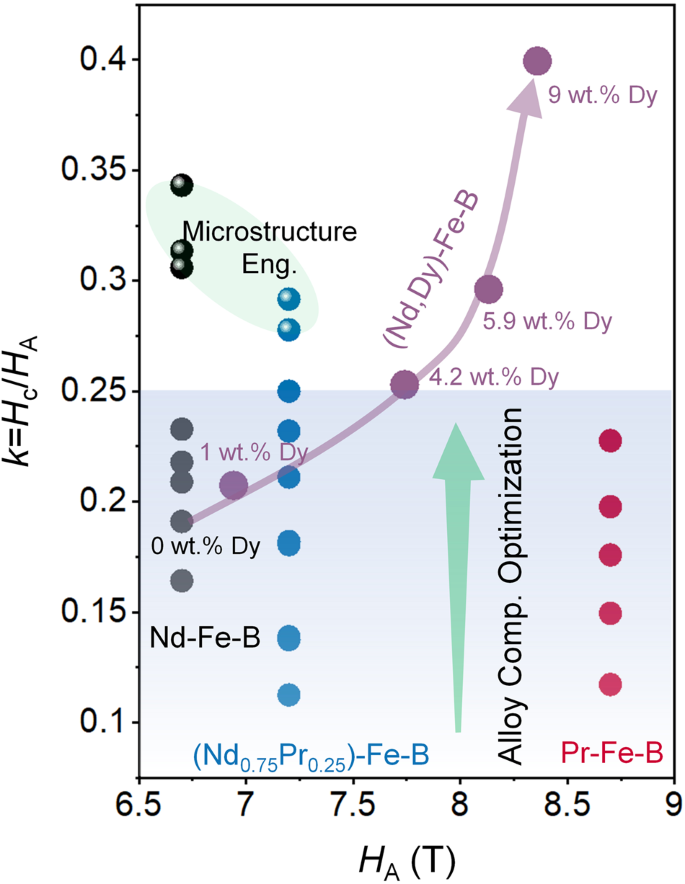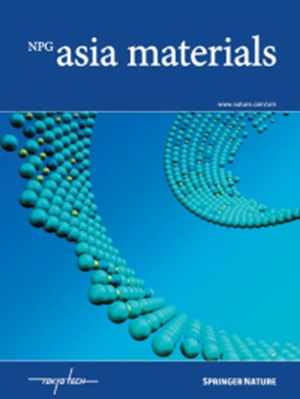Unveiling the origin of the large coercivity in (Nd, Dy)-Fe-B sintered magnets
IF 8.3
2区 材料科学
Q1 MATERIALS SCIENCE, MULTIDISCIPLINARY
引用次数: 0
Abstract
Nd-Fe-B-based permanent magnets are widely used for energy conversion applications. However, their usage at elevated temperatures is difficult due to the relatively low coercivity (Hc) with respect to the anisotropy field (HA) of the Nd2Fe14B compound, which is typically 0.2HA. In this work, we found that the coercivity of an (Nd0.8Dy0.2)-Fe-B sintered magnet could reach 0.4HA, which was twice as high as the Hc/HA of its Dy-free counterpart. Detailed microstructural characterizations, density functional theory and micromagnetic simulations showed that the large value of coercivity, Hc = 0.4HA, originated not only from the enhanced HA of the main phase (intrinsic factor) but also from the reduced magnetization of the thin intergranular phase (extrinsic factor). The latter was attributed to the dissolution of 4 at.% Dy in the intergranular phase that anti-ferromagnetically coupled with Fe. The reduction in the magnetization of the intergranular phase resulted in a change in the angular dependence of coercivity from the Kondorsky type for the Dy-free magnet to the Stoner–Wohlfarth-like shape for the Dy-containing magnet, indicating that the typical pinning-controlled coercivity mechanism began to show nucleation features as the magnetization of the intergranular phase was reduced by Dy substitution. The low coercivity in Nd-Fe-B-based magnets, which is limited to around 20% of the anisotropy field (HA) of the main phase, is a bottleneck for their usage at elevated temperatures. Herein, we overcome the limit and demonstrate a coercivity of 40% HA by tuning the magnetism of grain boundaries, enabling their applications at elevated temperatures.


揭示了(Nd, Dy)-Fe-B烧结磁体矫顽力大的原因
钕铁硼基永磁体广泛应用于能量转换领域。然而,由于Nd2Fe14B化合物的矫顽力(Hc)相对于各向异性场(HA)相对较低,通常为0.2HA,因此在高温下使用它们是困难的。在这项工作中,我们发现(Nd0.8Dy0.2)-Fe-B烧结磁体的矫顽力可以达到0.4HA,是其无dy对应物的Hc/HA的两倍。详细的显微组织表征、密度泛函理论和微磁模拟表明,大矫顽力Hc = 0.4HA不仅源于主相的HA增强(内在因素),也源于薄晶间相磁化强度的降低(外在因素)。后者归因于4 at的溶解。% Dy在与Fe反铁磁耦合的晶间相中。晶间相磁化强度的降低导致矫顽力的角依赖性从无Dy磁体的Kondorsky型转变为含Dy磁体的stoner - wohlfarth型,表明随着Dy取代降低了晶间相的磁化强度,典型的钉钉控制矫顽力机制开始呈现成核特征。nd - fe -b基磁体的低矫顽力限制在主相各向异性场(HA)的20%左右,这是其在高温下使用的瓶颈。在此,我们克服了这一限制,并通过调整晶界的磁性证明了40% HA的矫顽力,使其能够在高温下应用。
本文章由计算机程序翻译,如有差异,请以英文原文为准。
求助全文
约1分钟内获得全文
求助全文
来源期刊

Npg Asia Materials
MATERIALS SCIENCE, MULTIDISCIPLINARY-
CiteScore
15.40
自引率
1.00%
发文量
87
审稿时长
2 months
期刊介绍:
NPG Asia Materials is an open access, international journal that publishes peer-reviewed review and primary research articles in the field of materials sciences. The journal has a global outlook and reach, with a base in the Asia-Pacific region to reflect the significant and growing output of materials research from this area. The target audience for NPG Asia Materials is scientists and researchers involved in materials research, covering a wide range of disciplines including physical and chemical sciences, biotechnology, and nanotechnology. The journal particularly welcomes high-quality articles from rapidly advancing areas that bridge the gap between materials science and engineering, as well as the classical disciplines of physics, chemistry, and biology. NPG Asia Materials is abstracted/indexed in Journal Citation Reports/Science Edition Web of Knowledge, Google Scholar, Chemical Abstract Services, Scopus, Ulrichsweb (ProQuest), and Scirus.
 求助内容:
求助内容: 应助结果提醒方式:
应助结果提醒方式:


